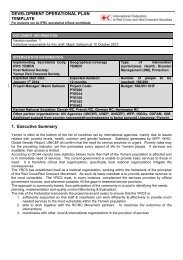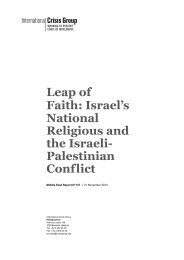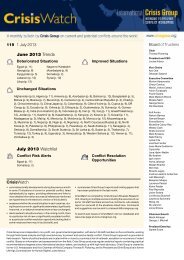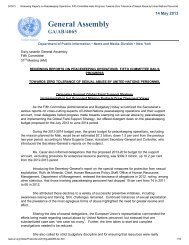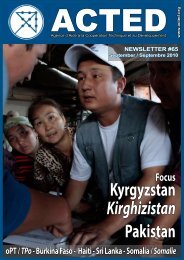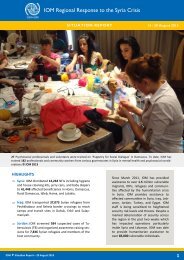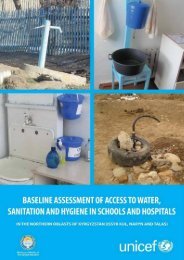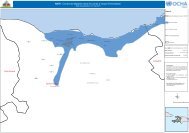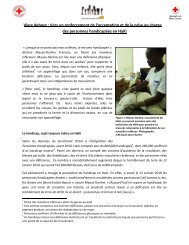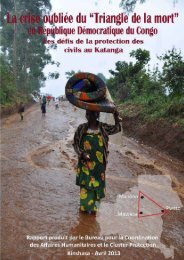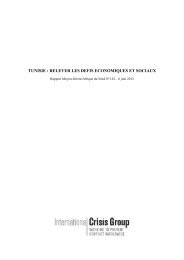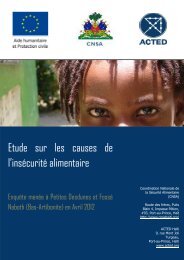SOMALI NUTRITION STRATEGY 2011 – 2013 - ReliefWeb
SOMALI NUTRITION STRATEGY 2011 – 2013 - ReliefWeb
SOMALI NUTRITION STRATEGY 2011 – 2013 - ReliefWeb
You also want an ePaper? Increase the reach of your titles
YUMPU automatically turns print PDFs into web optimized ePapers that Google loves.
14<br />
4.2 Partnerships<br />
Implementation of the strategy will be through partnership-based action, with the national and<br />
local authorities (Ministry of Health and other line ministries), with the local community, local<br />
NGOs and civil society, with the international community and with the private sector.<br />
a) National and local government<br />
Throughout the three zones, but more so in Somaliland and Puntland, government structures<br />
are in place and evolving. Governments have the responsibility to provide policy direction and<br />
leadership, promote inter-ministerial collaboration and advocate with religious and cultural<br />
institutions in priority areas. However, capacity is currently inadequate. In response to this, a key<br />
output of this strategy is to support the improvement of local capacity and structures within the<br />
ministries, in particular technical and financial support for the nutrition sector. Furthermore, this<br />
strategy should be included in the respective governments’ plans and priorities for next 3 years.<br />
b) The Community<br />
In areas where continuing insecurity and lack of access for international staff persists,<br />
implementation through local authorities, local NGOs and community based workers will be<br />
key delivery mechanisms. In line with Essential Package of Health Services, UNICEF/WHO’s<br />
Accelerated Young Child Survival initiative, the Reproductive Health strategy and GAVI HSS<br />
funds, the development of the role of the community health worker is essential for community<br />
mobilisation, individual support and promotion of good nutrition, hygiene and health practices.<br />
Furthermore the system of female community-based health workers proposed through GAVI HSS<br />
fund will allow expansion of community activities: the promotion of vitamin A for children and postpartum<br />
women, prevention and control of diarrhoea, promotion of early initiation and exclusive<br />
breastfeeding and appropriate complementary feeding practices for infants and young children,<br />
promotion of good nutrition for all the family in particular women, assessment of nutritional status<br />
and referral of malnourished children.<br />
Schools, religious and cultural institutions provide important structures within the community<br />
through which to deliver population based interventions such as deworming, early identification<br />
and referral of acute malnutrition and nutrition education.<br />
c) Local Non Governmental Organisations (NGOs) are very important partners in the delivery of<br />
interventions where access to the international community is restricted and government structures<br />
are weak. Again, capacity is often a limiting factor and is one of the priority areas to be addressed,<br />
in line with national and regional as well as UN national capacity development strategies. The<br />
development of regional training and mentoring cells will be an important initiative in improving<br />
capacity and the quality of nutrition programmes implemented by these local partners.<br />
d) International community<br />
Donors Over recent years, work by FSNAU has achieved a tremendous amount in highlighting<br />
the devastating nutrition situation in country and as a consequence, donor funding of emergency<br />
programmes has been good. The challenge is to keep nutrition as a priority for donors, UN,<br />
NGOs and the ministries and advocate for a longer term strategy in Somalia to address not only<br />
the critical acute malnutrition situation but also the underlying causes, if reduced mortality and<br />
optimal growth and development are to be addressed.<br />
United Nations (UN) This strategy will build on the already strong collaboration between United<br />
Nations (UN) agencies such as UNICEF, FAO/FSNAU, WFP, UNFPA and WHO working to<br />
improve maternal and child nutrition and health in Somalia. One key area of collaboration is<br />
around strengthening mechanisms to ensure a minimum package of essential services is delivered




